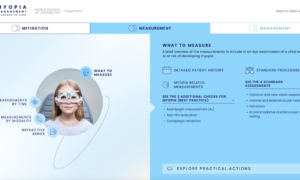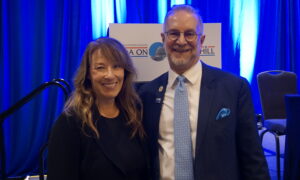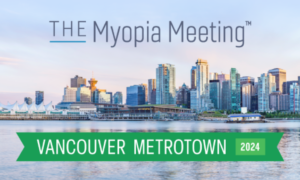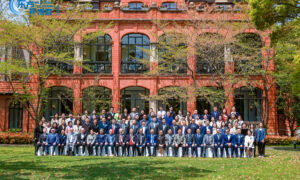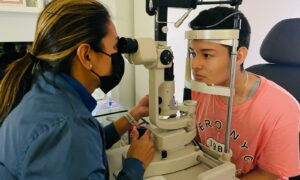August 2, 2021
By Dwight Akerman, OD, MBA, FAAO, FBCLA
Several products and interventions — which have been proposed for reducing the progression of myopia in the past — were either found not to be effective at all through randomized controlled clinical trials (RCTs), or the effects were so minor that they are not recommended as a routine treatment for myopic children. Examples of these ineffective products are under-corrected single-vision spectacle lenses, single-vision gas-permeable contact lenses with alignment fit, single-vision soft contact lenses, topical timolol, and acupuncture. Weak progressive myopia reduction effects were demonstrated with PAL and peripheral defocus spectacle lenses. Regrettably, many eye care professionals still rely on these ineffective or unproven products as their primary method of myopia care.
Case in point, nearly 50% of eye care professionals in a recent Review of Myopia Management and Jobson Optical Research poll responded that they prescribe “anti-fatigue and blue light filtering eyeglasses” to manage progressive myopia in children and adolescents.
Anti-fatigue spectacle lenses, also known as office or computer lenses, have been available for several years. Most lens designs incorporate a low ADD power (~ +0.50D to +0.75D), and some also include a small amount of base-in prism. These spectacle lens designs may help some emerging presbyopes or presbyopic adults experiencing headaches, blurred vision, and eyestrain while spending long hours reading or working on digital devices. However, anti-fatigue spectacle lenses have not been shown to slow the progression of myopia in children in any RCTs.
Blue-light-filtering spectacle lenses are purported to help reduce symptoms of eyestrain and “reduce the harmful blue light emissions from digital screens and transmit a helpful blue light range.” However, RCTs have not demonstrated a beneficial effect of blue-light-filtering spectacle lenses on slowing the progression of myopia in children compared to conventional anti-reflection coated spectacle lenses.1 Moreover, an RCT is currently being conducted at The Hong Kong Polytechnic University to investigate if blue-light-filtering spectacle lenses promote myopia progression in children (ClinicalTrials.gov Identifier: NCT03538002).
I urge you to commit to the highest level of care and prescribe the most appropriate evidence-based interventions to children at risk of progressive myopia.
Best professional regards,

Dwight H. Akerman, OD, MBA, FAAO, FBCLA
Chief Medical Editor
dwight.akerman@gmail.com
References
1 Zhao, H. L., Jiang, J., Yu, J., & Xu, H. M. (2017). Role of short-wavelength filtering lenses in delaying myopia progression and amelioration of asthenopia in juveniles. International journal of ophthalmology, 10(8), 1261.


